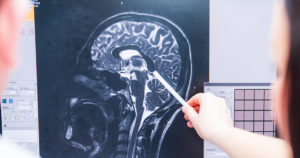Brain Injury Awareness Month : #MoreThanMyBrainInjury
February 24, 2021 According to the Brain Injury Association of America (BIAA), there are more than 5.3 million American children and adults who are living with permanent brain injury-related disabilities. Because there are so many people who sustain brain injuries and who face long-term or permanent medical complications as a result, the BIAA sponsors an annual awareness campaign every March. The theme of this year’s campaign is #MoreThanMyBrainInjury. The campaign’s goals are to increase the understanding of brain injuries as a chronic condition, to reduce the stigma that too often surrounds having a brain injury, to showcase the numerous causes of brain injuries as well as the people they affect, and to improve care and support services for individuals who suffer from them along with their loved ones.
According to the Brain Injury Association of America (BIAA), there are more than 5.3 million American children and adults who are living with permanent brain injury-related disabilities. Because there are so many people who sustain brain injuries and who face long-term or permanent medical complications as a result, the BIAA sponsors an annual awareness campaign every March. The theme of this year’s campaign is #MoreThanMyBrainInjury. The campaign’s goals are to increase the understanding of brain injuries as a chronic condition, to reduce the stigma that too often surrounds having a brain injury, to showcase the numerous causes of brain injuries as well as the people they affect, and to improve care and support services for individuals who suffer from them along with their loved ones.
Types of Brain Injuries: Traumatic Brain Injuries and Acquired Brain Injuries
In the United States, someone sustains a brain injury every 9 seconds. While every traumatic brain injury (TBI) is a type of acquired brain injury (ABI), not every acquired brain injury is a traumatic one. The BIAA defines an acquired brain injury as any injury to the brain that is not congenital, hereditary, degenerative, or induced by birth trauma. Some of the most common causes of acquired brain injuries include:
- Seizure disorder
- Electric shock
- Toxic exposure
- Automobile accidents
- Substance abuse or overdose
- Stroke
- Oxygen deprivation
Unlike acquired brain injuries, traumatic brain injuries result solely from trauma to the brain from an external force or forces. According to the BIAA, falls are responsible for nearly 48% of all traumatic brain injuries. Other top causes include vehicle-related collisions, assault, and struck by or against injuries. One in every 60 people lives with a TBI-related disability. Depending on the severity of an individual’s acquired brain injury or traumatic brain injury, the effects can be temporary, long-term, or permanent. In the most severe cases, acquired and traumatic brain injuries are fatal; in fact, the Centers for Disease Control and Prevention (CDC) estimate that approximately 155 people die from brain injuries every day.
Ways to Prevent Brain Injuries
Mitigating known risk factors is one of the most effective ways to reduce brain injury-related risks. Acquired brain injuries and traumatic brain injuries can cause an array of complications, including infection, post-concussion syndrome, impaired consciousness, physical effects (like mobility, coordination, and balance issues), altered senses (such as the loss of taste and smell or impaired vision), and various behavioral effects. People sustain brain injuries every day from getting hurt on the job, car accidents, and falls. While not all of these incidents are preventable, some of them are.
Here are some useful tips from the CDC on ways to prevent brain injuries from happening:
- Drivers and passengers should buckle up every time they are driving or riding in a motor vehicle
- Never drive under the influence of alcohol and/or drugs
- If you are playing a contact sport, riding a bike, riding a motorcycle, snowmobile, or scooter, are playing softball, riding a horse, skiing or snowboarding, or using in-line skates or riding a skateboard, wear a helmet or some other type of appropriate headgear
- Ensure that living and play areas are safe for children. This includes installing window guards to prevent falls and using safety gates at the bottom and top of stairs when young children are present
It is also critical that employers protect workers from known brain injury-related hazards. The Occupational Safety and Health Administration (OSHA) requires employers to provide workers with comprehensive safety training and personal protective equipment (PPE) to limit brain injury risks. Employers must also safeguard machinery and perform routine inspections and maintenance to ensure that all machinery and equipment, like scaffolding, personal fall arrest systems, and ladders, is in safe working order.
To commemorate this March’s Brain Injury Awareness Month, take a moment to learn more about traumatic and acquired brain injuries and ways to prevent them. If you or a loved one has questions about filing a brain injury-related legal claim, someone at our firm can help. Contact a representative online now.
Philadelphia Personal Injury Lawyers at Galfand Berger, LLP Representing Injured Individuals Since 1947
Galfand Berger LLP has offices located in Philadelphia, Bethlehem, Reading and Lancaster, we serve clients throughout Pennsylvania and New Jersey. To schedule a consultation, call us at 800-222-8792 or complete our online contact form.
 Google Screened
Google Screened
